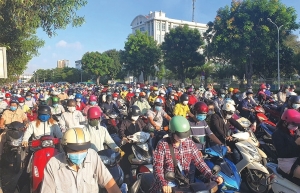Authorities step up to avert more job losses
 |
| The number of enterprises leaving the market this year has been cause for concern, Photo: Duc Thanh |
A month ago, the National Assembly (NA) delegation group of the Mekong Delta province of Long An organised a meeting with more than 200 constituents representing 400,000 factory workers from many industrial parks across the province.
“The workers said that their lives had become increasingly difficult due to companies’ reducing working hours and salaries, and a lack of accommodation,” said NA deputy Phan Thi My Dung, representing Long An.
According to many reports, the number of newly established enterprises and enterprises resuming operations has been slashed, while many operational businesses are suffering big losses and the number of businesses with dissolution and bankruptcy has kept increasing. Many enterprises have been suffering from a serious lack of orders, which has led to a rise in unemployment.
According to the Vietnam General Confederation of Labour, from September 2022 to January 2023, nearly 547,000 workers at 1,300 enterprises in the country had to reduce working hours or stop work – 75 per cent from foreign enterprises.
Meanwhile, the Ministry of Labour, Invalids, and Social Affairs last week reported to the NA that nearly 510,000 Vietnamese workers lost their jobs or had their work hours cut in the first five months of this year. Of the total, 280,000 people quit their jobs or were laid off, accounting for 54.79 per cent. They were mainly working in localities with large industrial parks and economic zones, such as Binh Duong, Dong Nai and Ho Chi Minh City in the south, and Bac Giang, Bac Ninh, Hai Duong and Hanoi in the north.
The textile and garment industry saw the largest numbers of workers laid off or having their hours cut, with 70,000 and 66,600, respectively. It was followed by leather and footwear, with 31,600 and 66,000; and manufacturing of electronic components and products, with 45,000 and 24,800.
“This bleak situation has been causing a big decrease in incomes. This could also mean a lack of safety and social disorder,” Dung said. “It is recommended that the government immediately take proper solutions. This is also an effective way to boost economic growth and achieve the desired goal of 6.5 per cent.”
According to the General Statistics Office (GSO), Vietnam’s five-month index of industrial production (IIP) dropped 2 per cent compared to the same period last year, when the IIP increased 8.1 per cent on-year.
The IIP for the processing and manufacturing sector declined 2.5 per cent against the corresponding period last year, when it rose 8.9 per cent on-year. The electricity production and distribution sector climbed only 0.8 per cent on-year, while the mining sector fell 3.5 per cent on-year, and the sector of water supply and wastewater and waste management and treatment expanded 6.4 per cent.
The IIP of many key sectors also witnessed an on-year fall, including engined vehicles at 10.1 per cent; paper and paper-based products 8.5 per cent; clothes 8.3 per cent; furniture 5.9 per cent, wood and wood products 5.8 per cent; transport means 5.6 per cent; metal 5.5 per cent; and electronics, computers, and optical products 5.1 per cent.
Stark warnings
NA deputy Tran Thi Hoa Ry, representing the Mekong Delta province of Bac Lieu, underlined the urgent need for the government to conduct a comprehensive review of the employment situation nationwide.
“The negative impacts of the pandemic have hurt the economy’s employment and personal incomes. Figures from the GSO show that unemployment remains enormous. In Q1 of 2023, about 150,000 people were driven into unemployment. It is expected that if enterprises continue facing big difficulties as they are doing now, unemployment will continue expanding,” Ry said. “In Q1/2023, the number of labourers drawing their social insurance packages increased strongly by 20 per cent on-year.”
Like many other NA deputies, Pham Trong Nghia from the northern province of Lang Son suggested that unemployment would cause many types of unwanted issues in society.
“The government needs to prepare plans for solving issues related to social security due to increased difficulties of enterprises, and to thoroughly review the domestic and international economic situation to have proper response scenarios,” Nghia said.
In its report sent to the NA, the Central Committee of the Vietnam Fatherland Front said that global instabilities had caused a slash in export orders for enterprises in Vietnam, leading to job losses and lower incomes for factory workers.
“Many business and production activities have been ineffective, with losses incurred and incomes of workers in many sectors plunging, while the lives of part of the population remains unstable post-pandemic,” the report read. “Constituents are anxious that if this situation continues, the number of enterprises leaving the market will continue to increase and the life of workers will become more difficult.”
Seeking a way out
Minister of Planning and Investment Nguyen Chi Dung told the NA that the main difficulties facing enterprises included a lack of output markets, difficulty accessing loans, cumbersome administrative procedures, and a need for a better business climate.
“Input costs and costs for compliance with legal regulations, and costs for access to the market, remain high. Enterprise difficulties are directly affecting employment, incomes, and workers’ livelihoods,” he said.
“These issues have received special attention from the government which has enacted a series of pro-business policies regarding reduction of lending rates, borrowing conditions, taxes, and fees. Going forward, the government will continue with stronger and more effective policies to support enterprises and assist economic growth.”
NA deputy Tran Thi Hien representing the northern province of Ha Nam underlined the need for the government to provide bigger support for businesses. “The government needs to have long-term preferential policies in corporate income tax and land rental, for example, instead of the existing temporary policies which won’t help enterprises recover quickly,” Hien said.
In the first five months of this year, Vietnam saw over 61,900 newly established businesses registered at $24.72 billion, using 405,900 workers – down 1.6 per cent in the number of enterprises, 25.3 per cent in registered capital, and 7.2 per cent in the number of labourers as compared to those in the corresponding period last year.
Meanwhile, the total five-month number of businesses leaving the market is 88,000, which is 27 per cent higher than the number of newly established ones. “This is an unprecedented situation. According to data since 2020 when the revised Law on Enterprises was enacted, the annual number of enterprises entering the market has always been far higher than those leaving the market,” Hien said.
“The establishment or dissolution of enterprises in an economy is a normal thing, but a sudden and abnormal increase in the number of businesses leaving the market needs to be thoroughly studied, with concrete solutions to be applied to each types of enterprises. This will help revive businesses’ performance and achieve the desired economic goal of 6.5 per cent.”
 | Plenty still to do to stabilise businesses In spite of the domestic economy’s gradual recovery, Vietnam is facing high risks caused by a rise in unemployment and uncertainties in the global market affecting the country’s economic prospects. |
 | Nation braced for dim job prospects Vietnam is faced with high unemployment and big risks emerging in the global market, affecting the country’s economic prospects. |
What the stars mean:
★ Poor ★ ★ Promising ★★★ Good ★★★★ Very good ★★★★★ Exceptional
Related Contents
Latest News
More News
- Nestlé Vietnam's Lunar New Year campaign reframes how Tet is counted (January 28, 2026 | 11:40)
- Tet event in Japan celebrates success of 14th National Party Congress (January 25, 2026 | 10:04)
- 14th National Party Congress wraps up with success (January 25, 2026 | 09:49)
- Congratulations from VFF Central Committee's int’l partners to 14th National Party Congress (January 25, 2026 | 09:46)
- List of newly-elected members of 14th Political Bureau announced (January 23, 2026 | 16:27)
- 14th Party Central Committee unanimously elects To Lam as General Secretary (January 23, 2026 | 16:22)
- List of members of 14th Party Central Committee announced (January 23, 2026 | 09:12)
- Highlights of fourth working day of 14th National Party Congress (January 23, 2026 | 09:06)
- Press provides timely, accurate coverage of 14th National Party Congress (January 22, 2026 | 09:49)
- Press release on second working day of 14th National Party Congress (January 22, 2026 | 09:19)

 Tag:
Tag:




















 Mobile Version
Mobile Version